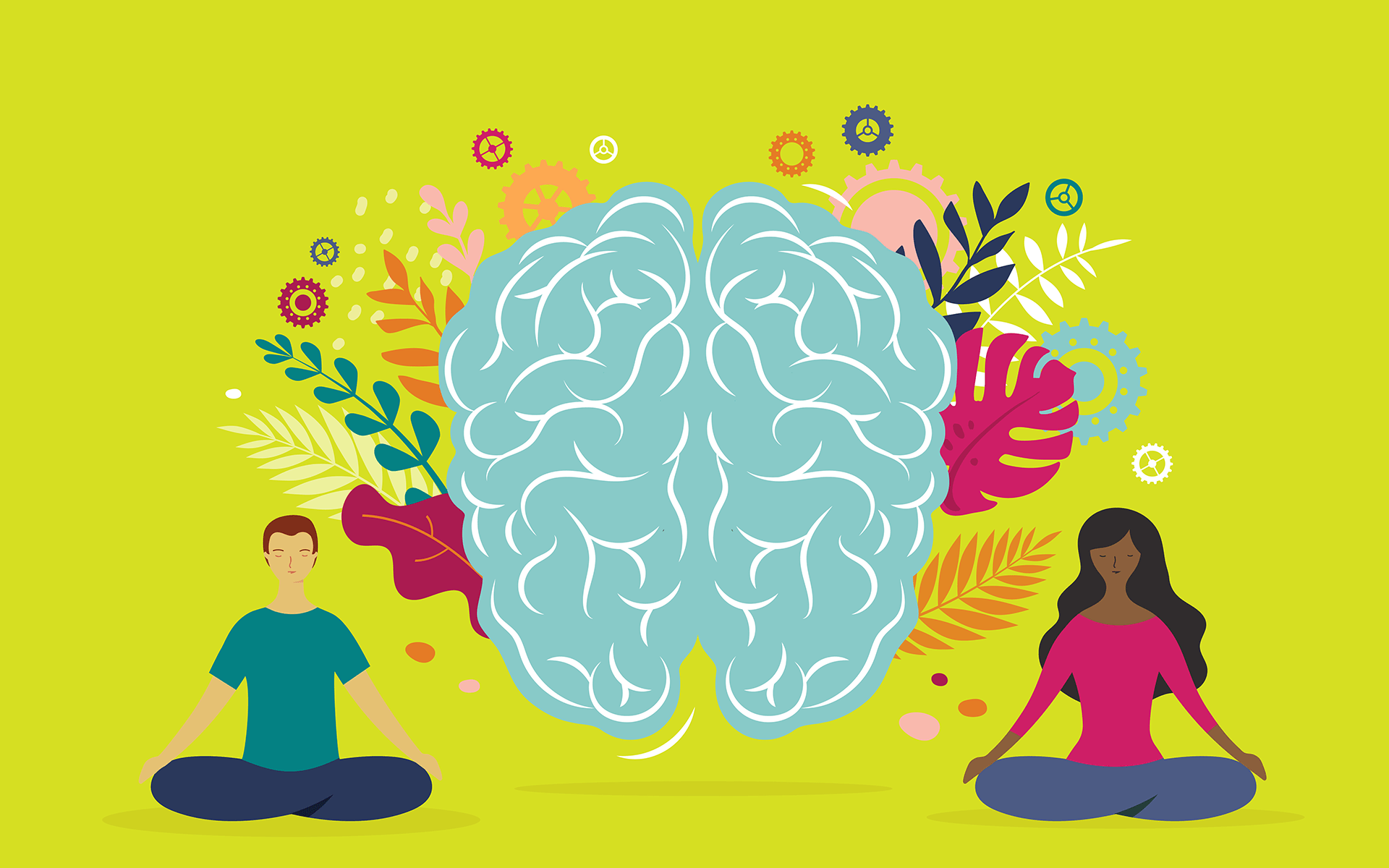Volatility. Uncertainty. Complexity. Ambiguity. In my lab at the University of Miami, these four words (shorthanded to “VUCA”) describe the type of high-stress, high-demand scenarios that can rapidly degrade one of our most powerful and influential brain systems: our attention.
My research team and I study people who regularly experience VUCA conditions as part of their jobs—soldiers, firefighters, organizational leaders, and more. We investigate the powers and vulnerabilities of the attention system, pinpoint the forces that degrade and weaken attention, and look for ways to protect and strengthen it.
We are facing unprecedented levels of social upheaval, environmental destruction, and political discord. All of these events influence our cognitive capacities—and it’s not for the better.
Right now, nine months into a grueling and unpredictable global pandemic, we are all living in VUCA conditions. Compounding the constant health and economic concerns, we are facing unprecedented levels of social upheaval, environmental destruction, and political discord. All of these events influence our cognitive capacities—and it’s not for the better. If you’ve been feeling overwhelmed or unfocused; if you’ve struggled with staying on task or been blindsided by emotion during this time—me too! But this is precisely what our prior research regarding the human brain’s attention system would predict.
Your attention system is complex and multifaceted, but the more you know about how it works, the more able you will be to navigate VUCA events. So here are 10 things you need to know about your attention—and how to protect it—that will serve you not only through this crisis, but for the rest of your life.
1. Your Attention Creates Your Reality
The reason we have “attention” is to solve one of the brain’s big problems: There is far more information in our environment (and in our own minds!) than the brain can fully process. Without a way to filter, the relentless sensory input would leave us overloaded, incapable of functioning effectively. The attention system is like a flashlight. It allows us to select and direct our brain’s computational resources to a smaller subset of the information. We can narrow our sights onto our conversation partner and boost her voice in a crowded room while dimming down other sights and sounds; it allows us to focus on a particular problem or happy memory from our past. During COVID, your attention is what allows you to hold, at the front of your mind, the new rules for living to successfully keep yourself and others safe.
So realize this: Your attention is powerful. It determines the moment-to-moment experience of your life—what you perceive, feel, remember, think, and do.
2. Your Attention is Vulnerable to Stress, Threat, and Poor Mood
Attention is, in some ways, your brain’s superpower. But like many superpowers, it has kryptonite: threat, stress, and poor mood will rapidly degrade your capacities. And these are things that occur quite regularly in VUCA conditions like fire season, military deployment, corporate bankruptcies and restructuring, or a global pandemic. COVID is producing circumstances that accelerate the rate at which attention is degraded as it jacks up attention’s kryptonite. During this protracted pandemic, we’re all experiencing a heightened sense of threat, new and constant stressors, anxious feelings, and more.
3. Your Attention is Limited—And So Is Your Working Memory
Working memory is an essential partner to attention: It’s what allows you to do something with the information you focus on. It’s what you use when you need to hold something in mind for a few seconds—for example, remembering that six-digit confirmation code, composing a phrase in your mind as you tap out a text, visualizing the route to a new location as you drive. Think of it as a mental whiteboard: a temporary scratch space where you can jot down crucial information.
We’re spending a lot of our vulnerable and limited attentional resources policing our instincts and behaviors, as well as overcoming impulses and habits.
But just like a real-life whiteboard, it’s only so big. You can fit about three or four items on it before you max out the space. And it has one important quirk: It uses disappearing ink. Anything you “write” on your mental whiteboard will start disappearing within a few seconds. If you want to keep it there longer, you have to keep focusing on it. In this COVID era, we are all running up against the limits of our whiteboards, all the time. We’re spending a lot of our vulnerable and limited attentional resources policing our instincts and behaviors, as well as overcoming impulses and habits. This sucks up our limited attention and our finite working memory capacity, leaving few cognitive resources for anything else.
4. Your Attention Wanders Often
In any particular moment, there’s a 50% chance you’re not really here. We’ve seen this in study after study: Half of the time, we’re mind wandering. And what most often captures our attention and pulls it away from the task at hand is our own thoughts and preoccupations. Our attention gets hijacked by mental content tied to stress, threat, and poor mood, the kryptonite for attention I mentioned earlier. And when this happens, we are more error-prone, our perception is dulled, and our mood sours.
Right now, we’re seeing an increase in people reporting “intrusive thoughts” about—you guessed it—COVID. And these COVID-related thoughts and worries that pop into our minds have a lot of pull. They can yank the flashlight of our attention away from what we’re doing, and it’s hard to pull it back. We experience uncertainty-related stress (How long will this go on?). We feel a threat, not only to our physical safety (to our health) but also our psychological safety, our norms, familiar routines, life as we knew it. And we struggle with poor mood, often heightened by a sense of isolation and loneliness. This pandemic has created the perfect circumstances for our attention to get easily, and constantly, hijacked.
5. Your Attention is Linked to Your Emotions
One of the biggest surprises about attention is how deeply it’s connected to emotion. Think about it this way: When we recall a happy memory or something sad or upsetting, we use our attention and working memory to do so. We fill up our whiteboards with the appropriate imagery, memory, and thought, and all of this is needed to construct the fullness of our emotional experience.
And it goes in the other direction as well—you need attentional bandwidth to regulate emotions as they come along. Example: You’re overcome by some feeling, and you need to get steady. What do you do? You think through the problem, or you distract yourself by focusing on some other topic, or you reframe the situation (Maybe it’s not as bad as I think…). All of these tactics require attention as their fuel. And if your fuel is in short supply (because it is idling on ruminative loops of distressing thought), you just won’t have the cognitive resources to regulate your emotions effectively. You end up feeling unsteady and dysregulated.
6. Your Attention is Essential for Connection
Until now, I’ve been describing attention as a resource for your own private use—you direct the flashlight of your attention to your own sensations, thoughts, feelings, and memories, and to the external environment. We also direct it toward other people to communicate and connect. Fascinatingly, we also use our working memory collaboratively. We use it to create a shared mental model so we can have a mutual understanding of what’s being communicated. “We’re not on the same page,” you might say to a friend, when you realize that your mental models are misaligned. We often need to be able to see things through someone else’s eyes. This is a critical aspect of connection.
Paying attention is one of the most compelling ways by which we can show our interest, care, and love for others.
Paying attention is one of the most compelling ways by which we can show our interest, care, and love for others. Yet, while physically distancing, we can’t offer up our attention in the usual way right now—COVID is depriving us of the essential ways in which we connect.
7. Your Attention Can Time-Travel
It’s an amazing capacity we have, to fast-forward our attention into the future, and to rewind back into the past. We can recall precious memories; we can imagine and plan. But under VUCA conditions, this capacity gets harder to control.
We end up—without much choice or agency—trapped in the past and future. We long for the way life used to be. We worry, catastrophize, and hope. All this uncertainty makes us much more likely to play out various possible scenarios over and over again. This ends up being unhelpful and unproductive planning, as we burn attentional fuel on imagined situations that may never come to pass. A recent study we conducted found that the more COVID-related intrusive thoughts people reported, the more depressed they were, and the poorer sleep quality they reported. These are some of the unfortunate consequences of mental time-travel run amok—especially now.
8. Your Attention is Easily Fooled
Your brain is an incredible virtual-reality machine. You can simulate all kinds of imagined scenarios and predictions. And you can do it all so vividly. But sometimes a simulation can be so convincing and transportive that it leads your attention system to recalibrate many brain networks as though it’s really happening. That means you often end up filtering out or overriding what’s really happening, right in front of you.
The uncertainty of the COVID era means you’re simulating a lot more. You’re imagining possible outcomes constantly—What if the vaccine isn’t effective? What if it isn’t safe? Will social upheaval transform our society for the better? What if it doesn’t? And during VUCA circumstances, our attention is more prone to being wholly transported into a simulated doomsday of our mind’s own making. And a critical aspect of attentional control may falter: our ability to realize that simulations are mental creations, and not reality. We forget that thoughts are not facts.
9. Your Attention Can Be a Bad Boss
We all know that stress makes us feel bad. But long periods of stress are especially taxing, working our attention overtime and rapidly degrading it. What once was our superpower turns against us.
One of my colleagues in the military has written about “shelter fatigue”: Highly trained individuals facing a long period of isolation will suddenly break quarantine, even while fully understanding the consequences. At a certain point, our cognitive capacities can become so degraded that we are unable to maintain new rules and goals in our working memory. They go out the window (or off the whiteboard) and instead, our attention leads us to do what is comfortable and familiar. Overcoming our social habits, for example, can be attentionally exhausting to work against. I think back to a visit from a close friend over the COVID summer; when I saw her, it took so much self-control not to rush up and hug her.
So, keep in mind that sometimes your attention may “direct” you to do something that isn’t in your best interests. It’s a bad boss.
10. Your Attention is Trainable
Right now, you’re in high-kryptonite conditions. What can you do about it? Well, this is the question we’ve been studying in the lab for many years, and we’ve found an answer: Practice mindfulness.
Mindfulness meditation, practiced regularly, protects attention under VUCA conditions. Because mindfulness practice is about keeping your attention in the present moment without judgment, elaboration, or reactivity, it becomes a kind of “mental armor” against some of the most damaging habits of mind: mind wandering, rumination, and catastrophizing, which significantly rachet up under VUCA conditions like the times we are living through now. Mindfulness practice helps restore attention so you can regulate your emotions and relate to them differently by allowing them to arise and then pass away. The practice trains us to keep our attention in the present moment and increases our ability to maintain an awareness of what’s happening in the mind so we aren’t as easily hijacked or fooled into believing that our thoughts are reality.
You need to have a regular daily practice in order to see measurable attentional improvements—we’ve found that as little as 12 minutes a day for 3 to 5 days a week is protective over high stress intervals.
While it’s helpful to start training before you enter a period of high demand, you can start now and still benefit. In our studies, we’ve noticed three things: 1) Short-form programs of eight hours of training show beneficial results within four weeks. 2) There is a minimum effective dose (you need to have a regular daily practice in order to see measurable attentional improvements—we’ve found that as little as 12 minutes a day for 3 to 5 days a week is protective over high stress intervals). 3) We see a dose-response effect (the more you do, the more you benefit).
With mindfulness practice, our mental fogginess begins to fade as our attention and working memory are protected and strengthened. Mind-wandering decreases, and our sense of clarity and well-being can bounce back. In this way, we are training our attention to be battle-ready for the VUCA circumstances of this pandemic and all those we may encounter for the rest of our lives.
read more
A Mindfulness of Breathing Exercise with Neuroscientist Amishi Jha
The sequence of events in this practice are: focus, sustain attention, notice, and redirect attention back to the breath when it wanders. This is what we might call a “push-up” for your attention. Read More
The Magnificent, Mysterious, Wild, Connected and Interconnected Brain
Our brain is like a wild, raging electrical storm that wondrously enables us to make our way. Yet a lot of mindfulness literature makes it sound like a very simple machine. Two leading neuroscientists suggest better ways to think and talk about the brain and the mind. Read More







